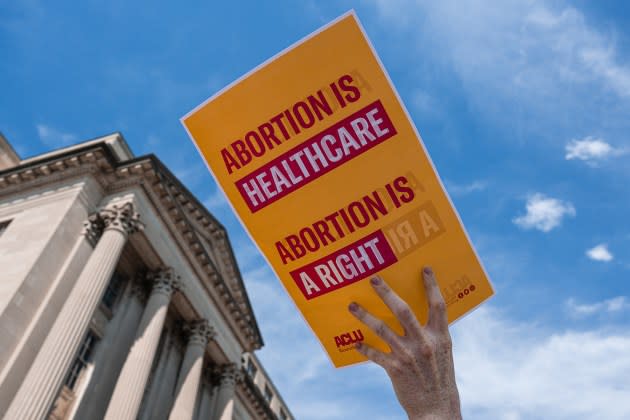Kentucky Woman Isn’t Dropping Lawsuit Despite Embryo Losing ‘Cardiac Activity’

Jane Doe, the pseudonymous plaintiff who brought a challenge to Kentucky’s near-total abortion ban on Friday, is no longer carrying a viable pregnancy, her lawyers informed the court Tuesday. No details were provided beyond the fact that Doe “learned her embryo no longer had cardiac activity” the day before.
The circumstances did not change her lawyers’ plans to proceed with their challenge to Kentucky’s near-total abortion ban.
“Jane Doe was seeking an abortion in Kentucky and wasn’t able to get one because of the abortion bans — and that fact has not changed,” Brigitte Amiri, deputy director at the ACLU’s Reproductive Freedom Project and one of the lawyers representing Doe, tells Rolling Stone.
When Doe, who was eight weeks pregnant, filed a lawsuit seeking permission to obtain an abortion on Friday, she became the second woman known to do so since the 1970s. The first, Kate Cox, was forced to flee her home state of Texas to obtain medical care earlier this week. The state Supreme Court later denied Cox’s request for an exception to that state’s abortion bans.
Doe’s case illustrates the difficult task facing advocates seeking to mount a challenge to Kentucky’s ban. Last year, the state Supreme Court ruled that health care providers do not have standing to challenge the law on behalf of women in Kentucky, as courts in other jurisdictions have previously allowed.
That was a significant departure from the norm: the Supreme Court has held that health care providers have the ability to raise the rights of their patients, because of the obstacles that patients face in terms of bringing cases themselves and the fact that pregnancy is a temporary condition — one that would end before the typical court case.
Nevertheless, the Kentucky Supreme Court declared in February that only a woman seeking an abortion herself could bring claims about the right to privacy and the right to self determination.
Since then, advocates have encouraged any women who are pregnant and seeking an abortion in Kentucky to step forward. Doe’s lawyers have asked for class action status in the lawsuit and are hoping her story may convince other potential plaintiffs to join the action.
No other details have been provided about Doe, who is challenging the law, in part, on the grounds that it violates her right to privacy. For that reason, says Rebecca Gibron of Planned Parenthood, “We want to keep not only her identity, but the specifics around her case very confidential.”
Last November, voters in Kentucky rejected an effort to remove protections for abortion from their state constitution, but the practice remains outlawed in the state under both a trigger ban and a six-week ban, both passed by state lawmakers in 2019. The bans contain no exceptions for rape, incest or fatal fetal conditions.
“Frankly, lawmakers are out of touch with their constituents,” Gibron says. “We know that, overwhelmingly, Kentuckians support the right to access abortion. We saw that in 2022 when Kentuckians voiced their opinion by voting down the constitutional amendment that would have removed protections for abortion in the state constitution. And just weeks ago Kentuckians showed their support for abortion with the reelection of Governor Beshear, who made access to care a priority in his campaign.”
Doe’s lawyers say the case will move forward, in spite of the fact that her pregnancy has ended. The next conference in the case is scheduled for Monday, December 18.
More from Rolling Stone
Texas Abortion Case Exposes GOP's Inability to Defend Their Own Laws
Texas Supreme Court Rules Against Pregnant Woman Seeking Emergency Abortion
Texas Woman Who Sued for Emergency Abortion Flees State to Get Care
Best of Rolling Stone

